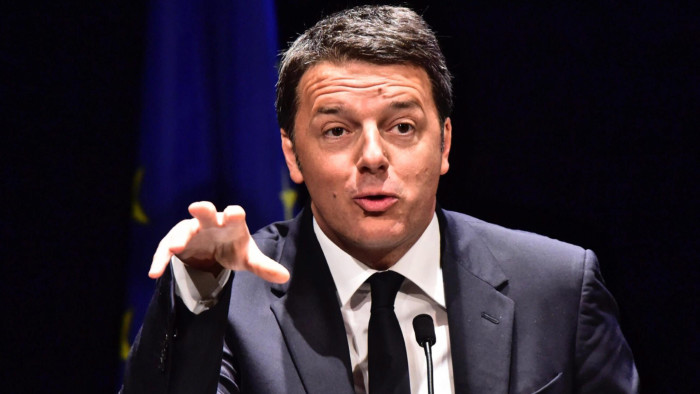Renzi ready to defy Brussels and bail out Italy’s troubled banks

Simply sign up to the European companies myFT Digest -- delivered directly to your inbox.
Italy is prepared to defy the EU and unilaterally pump billions of euros into its troubled banking system if it comes under severe systemic distress, a last-resort move that would smash through the bloc’s nascent regime for handling ailing banks.
Matteo Renzi, the Italian prime minister, is determined to intervene with public funds if necessary despite warnings from Brussels and Berlin over the need to respect rules that make creditors rather than taxpayers fund bank rescues, according to several officials and bankers familiar with their plans.
The threat has raised alarm among Europe’s regulators, who fear such a brazen intervention would devastate the credibility of the union’s newly implemented banking rule book during its first real test. In the race to find workable solutions, Margrethe Vestager, the EU’s competition chief, has laid out options for Rome to address its banking problems without breaking the bail-in principles of Europe’s banking union.
Italy is the eurozone’s biggest vulnerability following the shock outcome of the UK vote to leave the EU, with bank stocks plunging by a third. Concerns are building before the outcome of bank stress test results due this month and a constitutional referendum in Italy in early October, on which Mr Renzi has wagered his job. Citi has described the referendum as “probably the single biggest risk on the European political landscape this year outside the UK”.
After several of its ideas on intervention were rebuffed, Rome is considering whether to act alone. “We are willing to do whatever is necessary [to defend the banks], and do not rule out acting unilaterally, although that would only be as a last resort,” said one person familiar with the government’s thinking. European officials fear any Italian intervention would carry high risks, opening a battle over illegal state support that would put off private investors.
Angela Merkel, German chancellor , last week rebuffed Italy’s request for a suspension of state aid and bail-in rules in order to recapitalise its banks. Benoit Coeure, a senior European Central Bank official, has said any suspension of bail-in rules would spell the end of the banking union “as we know it”.
Mr Renzi has bristled at suggestions he is ignoring rules, saying he will not be “lectured by the school teacher”.
Rome is considering measures such as boosting the size of a state-sponsored privately backed fund called Atlante used to backstop capital increases at two failing banks, say senior bankers. Atlante will also launch a fund focused on non-performing loans within days aimed at buying bad loans built up during Italy’s three-year recession to avoid widespread writedowns.
It will first target bad loans at Monte dei Paschi di Siena, Italy’s biggest problem bank, according to senior bankers. Italy is also discussing the use of funds from Treasury-owned Cassa Depositi e Prestiti and state pension funds to recapitalise banks.
Brussels and Berlin have resisted any options that overpay banks for bad loans, or sidestep the need for creditors bail-in.
The Commission is open to Italy softening the blow on retail investors, either through converting their junior debt to equity on generous terms, or through later compensation to vulnerable households.
The restructuring options currently under discussion do not require the full resolution of any Italian banks, but debt-to-equity conversions. Rome should “stop pretending that there are no solutions other than setting the rules aside”, said one European official familiar with the discussions.
Brussels last week signed off €150bn worth of precautionary measures allowing Italy to help banks with short-term liquidity problems. But of greater concern is pressure on capital, say analysts. Stress test results are due on July 31 and senior bankers consider Italy’s weaker banks — including its third largest Monte dei Paschi — may be found to be undercapitalised.
Italy’s business lobby, Confindustria, on Friday warned of “political chaos” should Mr Renzi lose October’s referendum. Under such a scenario, Italy would re-enter recession, spreads on Italian debt would widen and there would be capital flight from Italy, Confindustria argued. Italian gross domestic product would fall 0.7 per cent in 2017 and drop a further 1.2 per cent in 2018, it added.
Comments